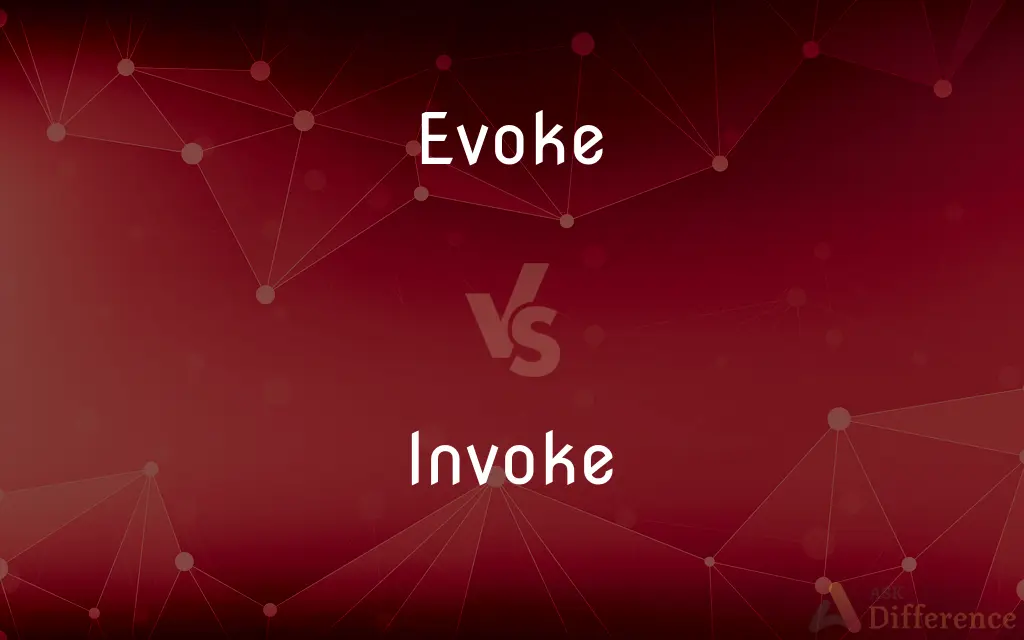Evoke vs. Invoke — What's the Difference?
Edited by Tayyaba Rehman — By Fiza Rafique — Updated on October 12, 2023
"Evoke" means to bring forth feelings or memories, while "Invoke" means to call upon authority or higher powers.

Difference Between Evoke and Invoke
Table of Contents
ADVERTISEMENT
Key Differences
"Evoke" primarily refers to bringing forth emotions, memories, or responses from a person. It's about eliciting or drawing out something internal. On the other hand, "Invoke" is more about calling upon something external, like a higher power, authority, or a particular law or right.
In the realm of art and literature, an artist or writer might "evoke" a particular emotion or feeling in their audience through their work. This could be a sense of nostalgia, sorrow, joy, or any other sentiment. In contrast, to "invoke" would mean to call upon an external source, perhaps by referencing a well-known figure or precedent in a speech or argument.
"Evoke" can also relate to summoning images, sounds, or sensations in the mind, like how a particular scent might evoke memories of one's childhood. Meanwhile, "Invoke" can be used in the context of prayer or ritual, where one might invoke a deity or spirit, seeking their intervention or blessings.
A photograph might "evoke" feelings of wanderlust, nostalgia, or awe in a viewer by showing scenes of nature, old cities, or significant events. Alternatively, one might "invoke" the Fifth Amendment in a court of law, emphasizing the right not to incriminate oneself.
In essence, while "Evoke" deals with drawing out internal reactions or sentiments, "Invoke" pertains to calling upon external entities, principles, or rights for a specific purpose or aid.
ADVERTISEMENT
Comparison Chart
Primary Definition
Bring forth emotions or memories
Call upon authority or powers
Common Usage
Art, literature, memories
Law, prayer, ritual
Example
Music can evoke strong emotions.
She invoked her right to remain silent.
Contextual Connotation
Eliciting internal reactions
Calling for external aid
Part of Speech
Verb
Verb
Compare with Definitions
Evoke
To bring forth emotions.
The song evoked tears from the audience.
Invoke
To appeal to as an authority.
He invoked the Constitution in his defense.
Evoke
To recall memories.
The aroma evoked memories of her grandmother's kitchen.
Invoke
To summon with incantations.
Witches are believed to invoke spirits.
Evoke
To give rise to; draw forth; produce
Words that evoked a smile.
Actions that evoked mistrust.
Invoke
To be the cause of.
His actions invoked outrage.
Evoke
To call to mind, as by suggestion, association, or reference
Songs that evoke old memories.
A speech that evoked the words of Jefferson.
Invoke
To call upon for aid or protection.
She invoked the deity in her prayers.
Evoke
To create anew, especially by means of the imagination
A novel that accurately evokes the Depression.
Invoke
To call on (a higher power) for assistance, support, or inspiration
"Stretching out her hands she had the air of a Greek woman who invoked a deity" (Ford Madox Ford).
Evoke
To summon by magical or supernatural power; conjure.
Invoke
To appeal to or cite in support or justification.
Evoke
To call out; to draw out or bring forth.
Invoke
To call for earnestly; solicit
Invoked the help of a passing motorist.
Evoke
To cause the manifestation of something (emotion, picture, etc.) in someone's mind or imagination.
Being here evokes long forgotten memories.
Seeing this happen equally evokes fear and anger in me.
The book evokes a detailed and lively picture of what life was like in the 19th century.
Invoke
To summon with incantations; conjure.
Evoke
To elicit a response.
Invoke
To resort to; use or apply
"Shamelessly, he invokes coincidence to achieve ironic effect" (Newsweek).
Evoke
To call out; to summon forth.
To evoke the queen of the fairies.
A regulating discipline of exercise, that whilst evoking the human energies, will not suffer them to be wasted.
Invoke
(Computers) To activate or start (a program, for example).
Evoke
To call away; to remove from one tribunal to another.
Invoke
(transitive) To call upon (a person, a god) for help, assistance or guidance.
Evoke
Call forth (emotions, feelings, and responses);
Arouse pity
Raise a smile
Evoke sympathy
Invoke
(transitive) To solicit, petition for, appeal to a favorable attitude.
The envoy invoked the King of Kings's magnanimity to reduce his province's tribute after another drought.
Evoke
Call forth;
Her behavior provoked a quarrel between the couple
Invoke
(transitive) To call to mind (something) for some purpose.
Evoke
Deduce (a principle) or construe (a meaning);
We drew out some interesting linguistic data from the native informant
Invoke
(transitive) To appeal for validation to a (notably cited) authority.
In certain Christian circles, invoking the Bible constitutes irrefutable proof.
Evoke
Evoke or call forth, with or as if by magic;
Raise the specter of unemployment
He conjured wild birds in the air
Stir a disturbance
Call down the spirits from the mountain
Invoke
(transitive) To conjure up with incantations.
This satanist ritual invokes Beelzebub.
Evoke
Call to mind or evoke
Invoke
(transitive) To bring about as an inevitable consequence.
Blasphemy is taboo as it may invoke divine wrath.
Evoke
To produce or suggest through artistry.
The painting evokes the beauty of nature.
Invoke
To cause (a program or subroutine) to execute.
Interactive programs let the users enter choices and invoke the corresponding routines.
Evoke
To call up or produce (thoughts, feelings).
Her speech evoked a sense of unity.
Invoke
To call on for aid or protection; to invite earnestly or solemnly; to summon; to address in prayer; to solicit or demand by invocation; to implore; as, to invoke the Supreme Being, or to invoke His and blessing.
Go, my dread lord, to your great grandsire's tomb, . . . Invoke his warlike spirit.
Invoke
Evoke or call forth, with or as if by magic;
Raise the specter of unemployment
He conjured wild birds in the air
Stir a disturbance
Call down the spirits from the mountain
Invoke
Cite as an authority; resort to;
He invoked the law that would save him
I appealed to the law of 1900
She invoked an ancient law
Invoke
Request earnestly (something from somebody); ask for aid or protection;
Appeal to somebody for help
Invoke God in times of trouble
Invoke
To make a request or citation.
The lawyer invoked a previous case as a precedent.
Common Curiosities
What's the main purpose of "Evoke"?
It's to bring forth emotions, memories, or responses.
Can "Evoke" be used in the context of art?
Yes, art can evoke feelings or memories in its audience.
Does "Evoke" deal with internal or external elements?
"Evoke" deals primarily with internal elements like feelings.
Which word is about eliciting reactions?
"Evoke" is about eliciting reactions or sentiments.
Can "Invoke" relate to prayer?
Yes, one might invoke a deity during a prayer.
How does a scent relate to "Evoke"?
A scent can evoke or bring back memories associated with it.
Does "Evoke" have a spiritual connotation?
Typically, no. It's more about feelings and memories.
What does "Invoke" usually refer to?
It refers to calling upon something external, like authority or higher powers.
In what context is "Invoke" commonly used?
In law, ritual, or when seeking intervention from a higher power.
How does "Invoke" relate to authority?
One might invoke authority as a basis or support for an argument.
How can I remember the difference between "Evoke" and "Invoke"?
Think of "Evoke" as drawing out feelings and "Invoke" as calling upon external help.
Can "Invoke" be used in a legal context?
Yes, like invoking a right or law in one's defense.
Can "Invoke" be about summoning entities?
Yes, like invoking spirits or deities in rituals.
Which word is more about internal experiences?
"Evoke" deals more with internal experiences.
Can "Invoke" mean to cause something?
Yes, like invoking a particular reaction or emotion.
Share Your Discovery

Previous Comparison
Crawfish vs. Crayfish
Next Comparison
Monument vs. MemorialAuthor Spotlight
Written by
Fiza RafiqueFiza Rafique is a skilled content writer at AskDifference.com, where she meticulously refines and enhances written pieces. Drawing from her vast editorial expertise, Fiza ensures clarity, accuracy, and precision in every article. Passionate about language, she continually seeks to elevate the quality of content for readers worldwide.
Edited by
Tayyaba RehmanTayyaba Rehman is a distinguished writer, currently serving as a primary contributor to askdifference.com. As a researcher in semantics and etymology, Tayyaba's passion for the complexity of languages and their distinctions has found a perfect home on the platform. Tayyaba delves into the intricacies of language, distinguishing between commonly confused words and phrases, thereby providing clarity for readers worldwide.














































